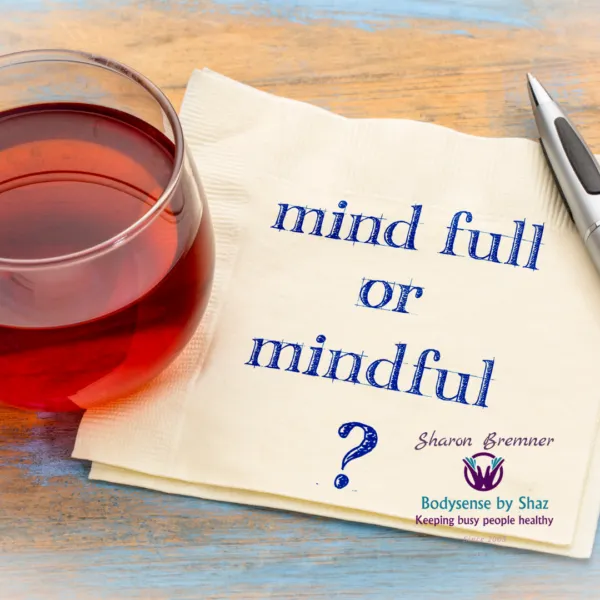Blog Posts

Can Mindfulness help you get things done?

This is a great question!
Mindfulness is the subject of countless recent books. It sounds lovely, being in the present moment, but how exactly does mindfulness help to improve your life? It’s possible that it can help clear your brain of the ‘mind fog’ that stops you concentrating and gets in the way of your creativity. So, put down your phone, turn off your social media notifications and get mindful.
We all know how it feels when our heads are so full of things to so and worry about that we are just too overwhelmed to get anything done. It’s quite frankly exhausting and drains our spirit as well as our energy. This ongoing stress has the same effect as keeping too many files on a laptop; after a while everything freezes, slows down or just shuts off. We’re told we should multi-task but that just makes everything ten times worse. Now we’re having to do ten things at once as well as think about ten things at once. It’s clearly not the way forward in the long term.
Research carried out on office staff back in 2005 showed that multitasking can have unwanted effects of the brain. Researchers monitored brain activity using an MRI scan and found that after multitasking people dropped ten IQ points on average, which is more than if they’d been smoking weed!
So, what can you do?
Stop trying to do everything at once. Try to concentrate on doing one thing at a time, no matter where you are or how busy you are. Only start something else when you’ve finished what you’re doing, or got to a point where you can’t do any more. Try this consciously for a week and see if you notice any changes in your energy, focus or creativity. See if it puts you in a better mood, too.

Look back over the week and be honest – how much have you achieved? Would you have managed to get through more or less if you’d stressed yourself out multitasking? Clear thinking gives you better choices on how to respond, act or react, feel and achieve what you want. You CAN let go of your mind baggage and clear your thoughts, and like most things, mindfulness gets easier the more you do it.
Here’s a simple routine to quieten the noise of a busy mind:
Sit or stand quietly for a few minutes and notice your breathing.
Once you’ve got used to the rhythm, start to breathe a little more deeply, into your lower abdomen. Breathe out through your mouth and in through your nose.
Notice your breath and concentrate on it as you inhale and exhale. As soon as a thought appears in your mind, acknowledge it, accept it and let it pass. Say to yourself out loud – or in your head…
I Release
I Flow
I Let Go
See how you get on with those exercises – and keep practicing for the best results.
Let me know how you go with these suggestions ❤️
Don’t Put Off The Massage

Some people never miss a regular massage session and credit them for keeping them healthy, de-stressed, supple and sane. Others only come for a massage when they get a money off voucher or something hurts. If possible, you should have regular massage even when you feel fine, because the effects of a regular treatment start to build up over time.
If you rarely get a massage, every time you come in, the therapist will have to un-do the same knots and work on the same areas. Life happens and we all get tense.
If you’re a regular client, she’ll know you well enough to work on those areas until you don’t need to have them un-knotted every time, and the effects on the rest of your body will be so much more powerful.

All in a day’s work
Working long hours and sitting in the same place wreaks havoc on your musculoskeletal system. You need this finely tuned system of bones, muscles and connective tissues to help you do pretty much everything, and when it’s neglected you get things like headaches, back pain and repetitive strain injury.
You can reduce the risk with regular massage therapy. A study from 2011 showed that having regular lower back massages helped to relieve back and joint pain before it got to the stage where it needed medication or taking time off work, both of which are a very good thing.
Who needs stress?
Why let yourself get stressed when you can prevent it with a regular dose of massage therapy? A regular session helps stop the insidious build-up of stress before you’ve even noticed it start to creep up. It’s not just about the obvious signs of stress that cause the problems, either. While you’re busy getting annoyed or stressed-out, your body is more susceptible to illness.
Stop the stress hormones in their tracks by booking in regularly for a preventative massage that takes all your cares away, even just for an hour. A massage increases the feel good hormones serotonin and dopamine and reduces the cortisol you produce too much of when you’re under stress.
We all sit still
Modern life isn’t exactly conducive to being active, most people have to sit at a desk or drive long hours and the average person probably sits still for eight or nine hours every single day. The effect of this is to make your shoulders round and pull forward, which in turn weakens your upper and lower back muscles – you’ll feel this in upper body aches and pains.

Regular massage combined with exercise is the dream team against bad posture and inactivity. A programme of both will help to reduce back, neck, and shoulder pain from sitting still for so long during working hours.
Are you convinced you should make that appointment yet? Even if you’re not stressed, working too hard, or sitting still all day, make massage a habit anyway and you’ll reap the benefits of a comforting, relaxing session that boosts happy hormones and just, well, makes you feel great.
6 Natural Ways to Help with
Generalized Anxiety Disorder (GAD)

What is Generalized Anxiety Disorder (GAD)?
A small sense of anxiety at times is normal but this anxiety disorder is often unexplained or unprovoked. People with generalized anxiety disorder (GAD) worry about the same things other people do, but it goes up to a higher level.
If you tend to have constant worries and fears that it interferes with your ability to function and relax, you may have generalized anxiety disorder (GAD).
Generalized anxiety disorder is mentally and physically exhausting. It drains your energy, interferes with sleep, and wears your body out. This anxiety is less intense than a panic attack, but much longer lasting, making normal life difficult and relaxation impossible. Listed below is 6 Natural Ways to Help with Generalized Anxiety Disorder (GAD)
GAD is a common anxiety disorder that involves constant and chronic worrying, nervousness, and tension.
Unlike a phobia, where your fear is connected to a specific thing or situation, the anxiety of GAD is diffused—a general feeling of dread or unease that colours your whole life.
You can often go about your daily activities and become filled with a sense of exaggerated worry and tension, even when there is little of nothing to provoke them.
The constant emotional worries in your head: feeling like you can’t control the intrusive thoughts, and feelings of dread and uncertainly are often worse at times of stress.
Sufferers can find it hard to relax and enjoy quiet time or be by themselves.





